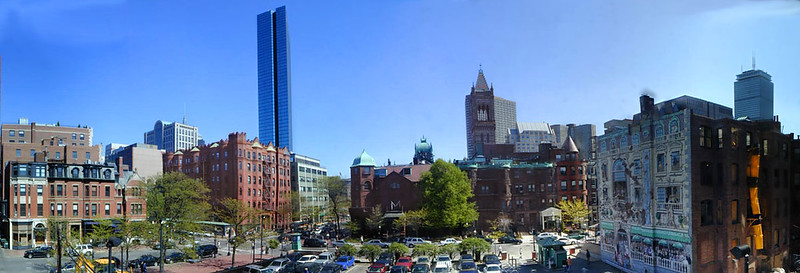Up Against a Wall
May. 28th, 2023 03:52 pmEvery so often, curiosity impels me to check out my former homes on Google Streetview, to see how much they’ve changed over time. Usually it’s nothing dramatic, but today’s exception left me stunned, shocked, and incredibly grateful.
Back in 2001, I bought my first – and to date only – property, a condo unit on the second floor of the historic former Hotel Vendome, located in Boston’s trendy Back Bay.
By far its most dramatic feature – and the reason I selected it after viewing seventy others – was a sweeping view of the neighborhood. The living room’s south-facing bay windows not only offered tons of delightful sunshine, but overlooked an empty lot that had served as a parking lot since 1958. It was the only unit I’d seen that had such a wide-open vista.
That panorama included many of Boston’s notable buildings: the Hancock tower, the Prudential tower, the New Old South Church with its distinctive Italianate campanile, 500 Boylston, 222 Berkeley, the Boston Art Club and the 1884 headquarters of the Massachusetts Bicycle Club (both now part of the Snowden School). I could watch shoppers walking along trendy Newbury Street, catch glimpses of Boston Marathon participants as they finished in Copley Square, or admire the colorful DuBarry trompe d’oeil mural that decorated the exterior of one of the buildings facing the parking lot.
It was truly a fabulous view, and I enjoyed it virtually every single day for the fifteen years that I lived there. Here’s what it looked like around the time I moved in (as always, click through for a larger version):

Of course, there were also days when it looked a little more like this:

It was no secret to me how great a blessing it was that no one had built anything on that lot. In fact, it was kind of a mystery why it never happened. Although I never heard rumor of any plans, it was something I always feared. But nothing ever materialized, and I moved out and sold the unit in February 2016.
So you can imagine my shock when I happened to check my old place out on StreetView. Here’s the closest equivalent to what you would see out my bay windows as of September 2022:

Yeah. Wow.
The lot was purchased in 2019 by L3 Capital in Chicago, who filed a project review in 2020 with the Boston Planning and Development Agency for a five-story, 43,000 square foot building containing retail and office space. A building permit was issued a year later, and construction appears to have moved along rapidly.
So that accounts for my “stunned and shocked” reaction.
As for “gratitude”, that comes from having enjoyed that unsurpassed view for fifteen wonderful years, and for the blind luck of having sold when I did, just four years before this development project came to light, on land that had been a parking lot for the previous sixty years!
My Back Bay condo was a truly amazing place to live, and that panoramic view was a huge, irreplaceable part of it. But that treasured view is one that I truly can never again experience.
